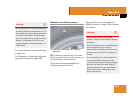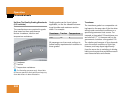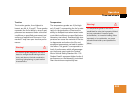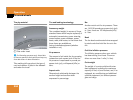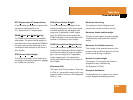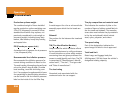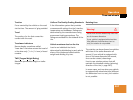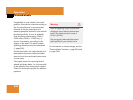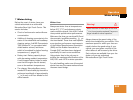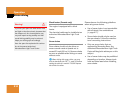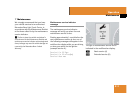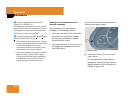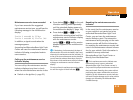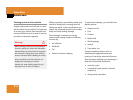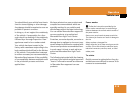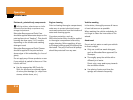
309
Operation
Winter driving
̄ Winter driving
Before the onset of winter, have your
vehicle winterized at an authorized
Mercedes-Benz Light Truck Center. This
service includes:
ț Check of anticorrosion and antifreeze
concentration.
ț Addition of cleaning concentrate to the
water of the windshield and headlamp
cleaning system. Add MB Concentrate
“MB SummerFit” to a premixed wind-
shield washer solvent/antifreeze
which is formulated for below freezing
temperatures (
୴ page 430).
ț Battery test. Battery capacity drops
with decreasing ambient temperature.
A well charged battery helps to make
sure that the engine can be started,
even at low ambient temperatures.
ț Tire change. Mercedes-Benz recom-
mends M+S rated radial-ply tires with a
minimum tread depth of approximately
1
/
6
in (4 mm) on all four wheels for the
winter season.
Winter tires
Always use winter tires at temperatures
below 45°F (7°C) and whenever wintry
road conditions prevail. Not all M+S rated
tires provide special winter performance.
Make sure the tires you use show M+S and
the mountain/snowflake marking . on
the tire sidewall. These tires meet specific
snow traction performance requirements
of the Rubber Manufacturers Association
(RMA) and the Rubber Association of
Canada (RAC) and have been designed
specifically for use in snow conditions.
Using winter tires is the only way to
achieve the maximum effectiveness of the
ABS, ESP
®
and 4-ETS in winter operation.
For safe handling, make sure all mounted
winter tires are of the same make and have
the same tread design.
Always observe the speed rating of the
winter tires installed on your vehicle. If the
maximum speed for which your tires are
rated is below the speed rating of your
vehicle, you must place a notice to this
effect where it will be seen by the driver.
Such notices are available from your tire
dealer or from any authorized
Mercedes-Benz Light Truck Center.
Warning! G
Winter tires with a tread depth of less than
1
/
6
in (4 mm) must be replaced. They are no
longer suitable for winter operation.



